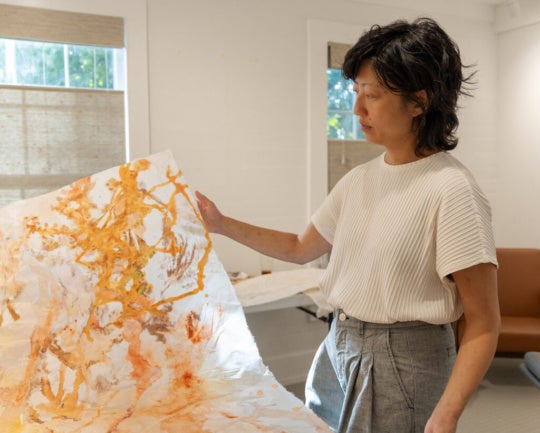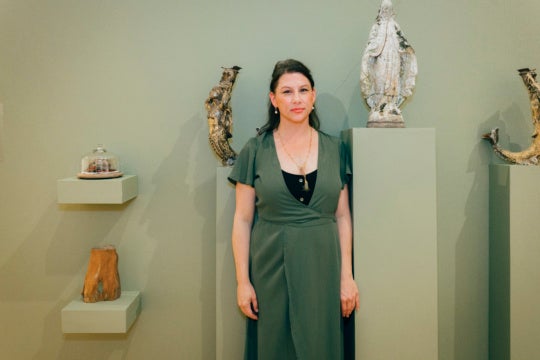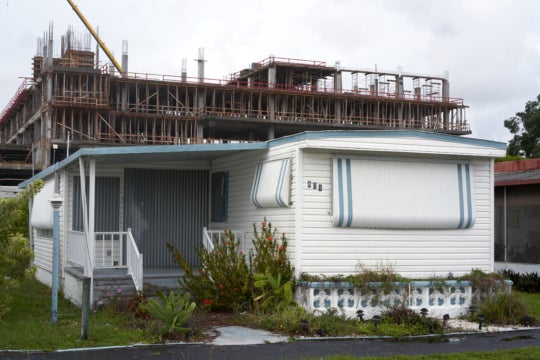
Walking to the Shoebox Gallery, located just on the edge of the Goat Farm property puts one in the mood of discovery. Similar to the rest of the Goat Farm campus, there is a sense of wonder coupled with the feeling you are somewhere you don’t belong. In this space, the Shoebox Gallery fits right in. The sense of adventure required to find the gallery mirrors the conceptual themes prevalent in the recent exhibition, The Fraternal Order of Light Hunters, on view from December 8, 2012-January 8, 2013. In the makeshift gallery, organized by Sarah Flinn and Mimi Hart Silver, artists John Paul Floyd, Chris McClure, and Justin Weaver lure us with a revolutionized definition of the South with their striking silver gelatin photographs.
The Fraternal Order of Light Hunters is the second exhibition at the Shoebox Gallery and deliberately features an all male cast. (The premiere exhibition, Passage, was a selection of all female artists who currently occupy studios at the Goat Farm.) The gallery was created out of an abandoned shipping container that is situated on a grassy knoll overlooking the CSX train tracks. And through a seemingly simple transformation with sheet rock and track lighting, a gallery was born. Though the space is small, it has potential to fill a gap in the diminishing gallery landscape in light of the recent mass exodus of exhibition spaces in town.

Exhibited thematically, each photographers’ voice carries along an adventure tale that explores the south through fresh and intrigued lenses. Though all three artists live in Atlanta, there is a lack of the urban landscape or commercial activity in the photographs. The artists instead focus on remote and wooded areas or unidentifiable underground venues. Often, there is a feeling of innocent voyeurism, as the subjects don’t usually confront the lens—as in the mural sized photograph, Lighthunter 11, by Justin Weaver, where a young man stands shirtless, bearing arms, with a bandana covering his face. Slightly militant while maintaining a strong sense of fantasy, we have stepped inside this young man’s head where dreams of a revolution march. Lighthunter 11 comes across more humorous while dodging the overtly controversial topic of gun control.

In John Paul Floyd’s Kentucky Fern, a small silver gelatin print of drooping fern leaves, we experience a sentimental side of this adventurous show. One can’t help but feel like the Order is trying to inform us that a definition of the South is not easy. Kentucky Fern reveals an unexpected tenderness in light of the masculine toys, guns, and feats of strength in neighboring photographs. Throughout the exhibition, the South is revealed as a personal narrative from these three artists. It’s a story that is assertively redefining what Southern art is—something discoverable, alive, young, and raw.
The photographic prints show the mastery of the silver gelatin process these artists posses. Also just as striking is the array of shooting styles exhibited—from a snapshot to a carefully composed landscape. The remarkable photograph NC2072 by Chris McClure extends 36 x 72 inches, and shows the frontal perspective of a small airplane against a background of silent trees and a crisp afternoon sky. The large print encompasses your whole field of vision, allowing us to become enveloped in the scenery; the inclusive nature of all three photographer’s work is strong. Justin Weaver’s Lighthunter 10 is a dark print illuminated by a fire that the subject seems to be conjuring with his hands. A rawness of the moment bares itself to us.

Unabashedly Southern, The Fraternal Order of the Light Hunters delivers a long awaited definition of Southern photography. And it’s not one that comes through the lens of a visitor, nor as one too insular; instead it’s a redefining of adventure as something to continually be sought after, not already known to us.
The Shoebox Gallery plans to reopen with new exhibition programming this Spring.
Disclosure: Chris McClure is president of BURNAWAY ‘s Board of Directors. In pursuit of featuring work that significantly contributes to cultural discourse, as well as our commitment to transparency, our policy is to disclose instead of exclude.




